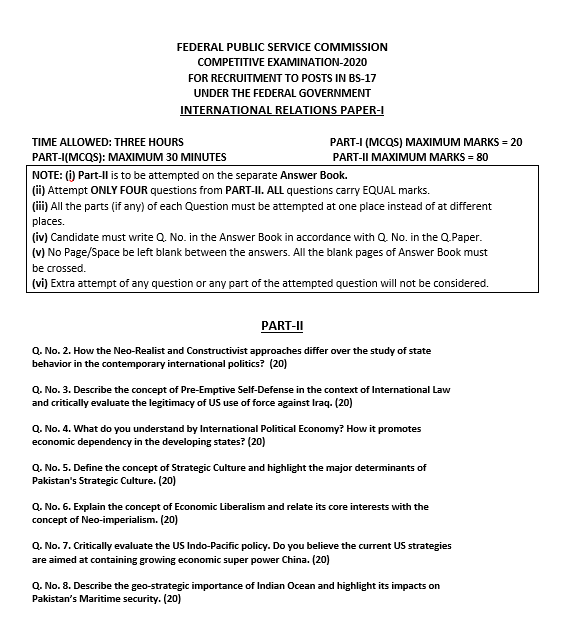CSS International Relations 2020 paper(a)
No. 2. How do the Neo-Realist and Constructivist approaches differ in the study of state behavior in contemporary international politics? (20)
No. 3. Describe the concept of Pre-Emptive Self-Defense in the context of International Law and critically evaluate the legitimacy of the US use of force against Iraq. (20)
No. 4. What do you understand by International Political Economy? How it promote economic dependency in the developing states? (20)
No. 5. Define the concept of Strategic Culture and highlight the major determinants of Pakistan’s Strategic Culture. (20)
No. 6. Explain the concept of Economic Liberalism and relate its core interests with the concept of Neo-imperialism. (20)
No. 7. Critically evaluate the US Indo-Pacific policy. Do you believe the current US strategies are aimed at containing the growing economic superpower China? (20)
No. 8. Describe the geo-strategic importance of the Indian Ocean and highlight its impacts on Pakistan’s Maritime security. (20)
Summary of Questions:
No. 2. How do the Neo-Realist and Constructivist approaches differ in the study of state behavior in contemporary international politics?
Neo-Realism and Constructivism offer different perspectives on state behavior. Neo-Realism focuses on the structure of the international system and the balance of power between states, emphasizing that states act in their interest to ensure survival. In contrast, Constructivism looks at how ideas, beliefs, and identities shape state behavior, arguing that international relations are socially constructed rather than purely driven by material interests.
No. 3. Describe the concept of Pre-Emptive Self-Defense in the context of International Law and critically evaluate the legitimacy of the US use of force against Iraq.
Pre-emptive self-defense in international law refers to a state’s right to use force to defend itself from an imminent attack, even before the threat materializes. Critics argue that the US invasion of Iraq in 2003 was not a legitimate act of self-defense, as there was no clear evidence of an immediate threat from Iraq, and it may have violated international law on the use of force.
No. 4. What do you understand by International Political Economy? How does it promote economic dependency in developing states?
International Political Economy (IPE) examines the relationship between politics and economics on a global scale. It studies how global economic systems, like trade and finance, influence state behavior. IPE often leads to economic dependency in developing states as these nations rely on developed countries for investment, technology, and markets, limiting their ability to achieve independent economic growth.
No. 5. Define the concept of Strategic Culture and highlight the major determinants of Pakistan’s Strategic Culture.
Strategic Culture refers to the beliefs, traditions, and values that shape a country’s approach to security and defense. In Pakistan, major determinants of its strategic culture include its historical experiences, the perceived threat from neighboring India, its nuclear weapons policy, and its military-centric mindset, which influences its foreign and defense policies.
No. 6. Explain the concept of Economic Liberalism and relate its core interests with the concept of Neo-imperialism.
Economic Liberalism promotes free markets, minimal state interference, and global trade as a means of ensuring economic growth and cooperation. Its core interests include maximizing profits and encouraging globalization. Neo-imperialism, however, critiques this system as a form of economic dominance by powerful countries, which can exploit developing nations through unfair trade practices, often leading to new forms of imperialism.
No. 7. Critically evaluate the US Indo-Pacific policy. Do you believe the current US strategies are aimed at containing the growing economic superpower China?
The US Indo-Pacific policy is aimed at strengthening its strategic presence in the region through military alliances and partnerships, particularly with countries like Japan, India, and Australia. Critics argue that this policy is largely focused on countering China’s growing economic and military power, viewing it as an effort to contain China’s rise and influence in the region.
No. 8. Describe the geo-strategic importance of the Indian Ocean and highlight its impacts on Pakistan’s Maritime security.
The Indian Ocean holds significant geostrategic importance due to its vital trade routes, energy supply lines, and proximity to major international powers. For Pakistan, its location along the Indian Ocean affects its maritime security, as it must manage the threats of naval blockades, and regional rivalries, and secure vital sea lanes for trade and energy imports.
